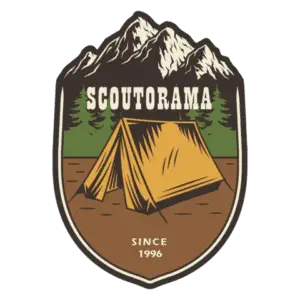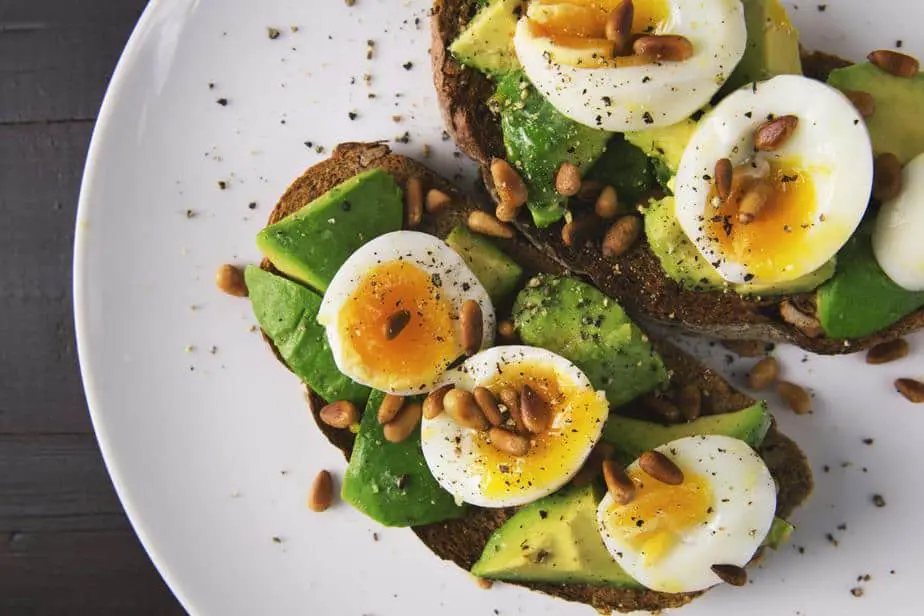All those pop tarts and cheetos finally getting to you and slowing you down at the gym? Time to focus on your food so you can
climb better, faster, and stronger. Proper nutrition is just as important as your training plan.
Eating right will help you avoid injury, recover faster, feel more energized, build strength and endurance, and crush your climbing goals. Get some of my best rock climbing nutrition tips below,
dietitian approved.
I’m a rock climber and also a
registered dietitian nutritionist. I love food and I love staying active and healthy. I like to focus on the right foods at the right times so that I feel my best and can perform at my best. Hopefully you can get some good tips to find what works best for you.
Always listen to your body and focus on how you are feeling, your energy levels, your sleep quality, stress level, etc. Nutrition can affect a lot! And remember, every individual is different. Recommendations can be tailored based on individual size, calorie needs, taste preference, and training pattern. Learn how to balance calories from the right sources at different times of the day for optimal performance below.
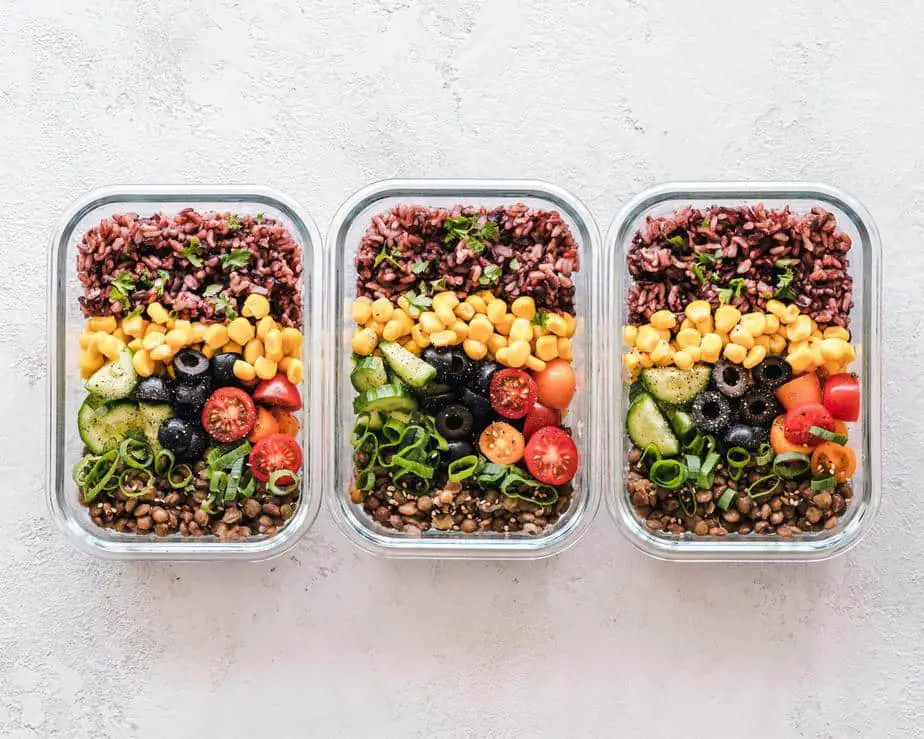
What Do Pro Rock Climbers Eat?
Professional rock climbers need a committed nutrition plan in order to fuel their bodies appropriately. They focus on
nutrient-dense foods, and specific food groups during specific times of the day, planned around their types of training sessions.
The pros focus their meals on healthy carbohydrates, protein, healthy fats, and water:
- Healthy carbohydrates– They choose carbs from good sources like oats, whole grains, beans, etc. for more long-lasting energy during training sessions.
- Protein– The pros focus on lots of protein to keep them feeling full during the day, such as cottage cheese, chia seeds, egg whites, nut butter, Greek yogurt, beans, and other dairy and meats etc.
- Healthy fats– from fish, avocados, nuts, and seeds
- Water– it’s not only important to stay hydrated during climbing and training, but throughout the whole day
The professional climbers focus on whole foods and eat fewer processed foods. Some favorites for pre-climbing meals include oatmeal with seeds and nut butter for breakfast, salads and grain bowls full of healthy nutrients for lunch, and fish with greens and sweet potatoes for dinner. These supply plenty of protein to keep them feeling full throughout a long day of training or climbing and all the nutrients they need to support exercise, endurance, and recovery.
Many professional climbers are also vegetarian and vegan for various reasons. As long as you have a good plan for consuming enough
protein, calcium,
iron, and other vitamins and minerals including zinc, vitamin B12, vitamin D, and omega-3s, you can still have a healthy diet. A vegan or vegetarian can easily meet recommendations for all of these nutrients with the addition of specific well-planned foods, fortified foods, and supplements, if needed.
Components of a Pre-Workout Snack for Rock Climbing:
Climbers don’t need to diet, you just need to learn how to eat right and
eat smarter. The positive effects of your nutrition will improve many aspects of your life, like your climbing ability and potential. The correct nutritional plan can help you
climb longer, harder, stronger, and have an
easier recovery. Choosing what to eat
BEFORE climbing is essential because it will fuel your workout with the energy and nutrients your body needs to climb at your top potential.
Similarly to how the pros eat, here are the components of a perfect pre-workout snack before indoor climbing. Below I’ll list some snack examples that incorporate all these nutrients to give you a good starting point so you can create your own
perfect pre-workout plan.
Healthy Carbohydrates-
Carbohydrates are your muscle’s main source of energy, so you want to have enough fuel ready to go before exercise. While lots of carbs are important, a correct balance is important, so you don’t want to over-do it on carbs. Your body can only store a small amount of carbs, so you’ll want to refill your stores throughout the day in order to have the right amount stored to perform at your top potential while climbing.
Choose carbohydrates from healthier options such as whole-grains, beans, potatoes, rice, oatmeal, tortillas, and other fruits and vegetables and whole-wheat grains. Some people are more sensitive to certain foods and prone to stomach issues and abdominal distress. Fiber may cause some of these problems, so whole-wheat bread/pasta/etc. may cause bloating for some individuals.
You don’t always have to eat whole wheat bread instead of white, but choose
whole food sources when possible and limit overly-processed carbohydrates such as white breads, sugary foods, cereals, and desserts.
Dairy products also supply carbohydrates, but some people may be more sensitive to dairy and choose not to consume it as often. Know your limits. Greek yogurt, cottage cheese, milk, and chocolate milk are some good options, if tolerated well.
You’ll want around 4-5 grams of carbohydrate per kilogram of bodyweight (take pounds and divide by 2.2 to convert to kg) as part of your pre-workout climbing
meal (4 hours before), and 1-2 grams of carb per kilogram as part of your pre-workout
snack.
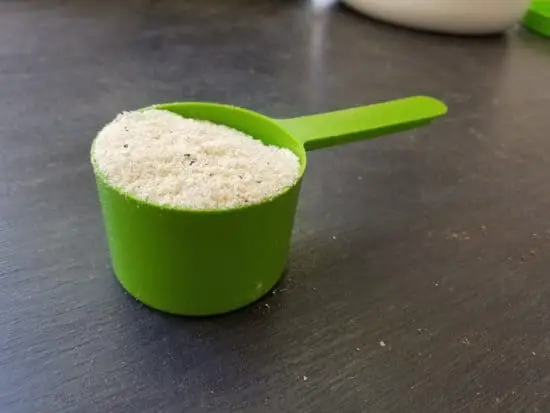
Protein-
Protein helps support muscle breakdown and repair, and also helps you to feel full for longer, so you aren’t training on an empty stomach. Protein contributes a small amount to energy as well. You don’t need much protein right before working out, it’s important to focus on protein afterward and during the day. Make sure you are getting enough protein
regularly spaced throughout the day to support your exercise and recovery and help you from feeling fatigued.
Gym climbers need about
1.2-1.4 grams of protein per kilogram of body weight per day. On strength and power training days, you’ll want to increase that amount to 1.2-1.7 grams per kilogram.
Recommended daily protein amounts for climbers:
| Climber Weight |
Endurance Training (1.2-1.4 g) |
Strength/Power Training (1.2-1.7 g) |
| 110 lbs/50 kg |
60-70 grams |
60-85 grams |
| 120 lbs/55 kg |
66-77 grams |
66-94 grams |
| 130 lbs/59 kg |
71-83 grams |
71-100 grams |
| 140 lbs/64 kg |
77-90 grams |
77-109 grams |
| 150 lbs/68 kg |
81-95 grams |
81-116 grams |
| 160 lbs/73 kg |
87-103 grams |
87-124 grams |
| 170 lbs/77 kg |
93-108 grams |
93-131 grams |
| 180 lbs/82 kg |
98-115 grams |
98-139 grams |
That equals an average recommendation of about 80-120 grams of protein per day for most climbers. That’s about 20% of your total calories coming from protein. Make sure you are getting enough protein regularly spaced throughout the day.
You need about
20-30 grams of protein at each meal, and
15 grams of protein at snacks. Chances are you are already getting plenty of protein. Most climbers don’t need to change their diets in order to boost their protein intake, you just need to be smarter about your food choices and your protein timing.
What about protein powders and bars? Protein powders aren’t typically necessary, but may be helpful. Some of my favorites are (click to view on Amazon):
NAKED , Orgain
, Orgain , Swanson,
, Swanson,  Optimum Nutrition
Optimum Nutrition , Garden of Life.
, Garden of Life.
Plant-based options are:
PlantFusion , Vega One
, Vega One , Garden of Life
, Garden of Life , Tone it Up (for women),
, Tone it Up (for women),
or
Now Sports Pea Protein. Perfect Bar
Perfect Bar , RXBAR
, RXBAR ,
, and
Clif Bar
are some of my favorite protein bars. (I also like
LARABAR
but they are lower in protein).
For more details on protein bars or energy bars, read this
article from Fueling Teens
.
I wrote more details about protein intake for climbers, and made a
meal plan for rock climbers, in this post:
The Best Diet for Rock Climbers with FREE Meal Plan
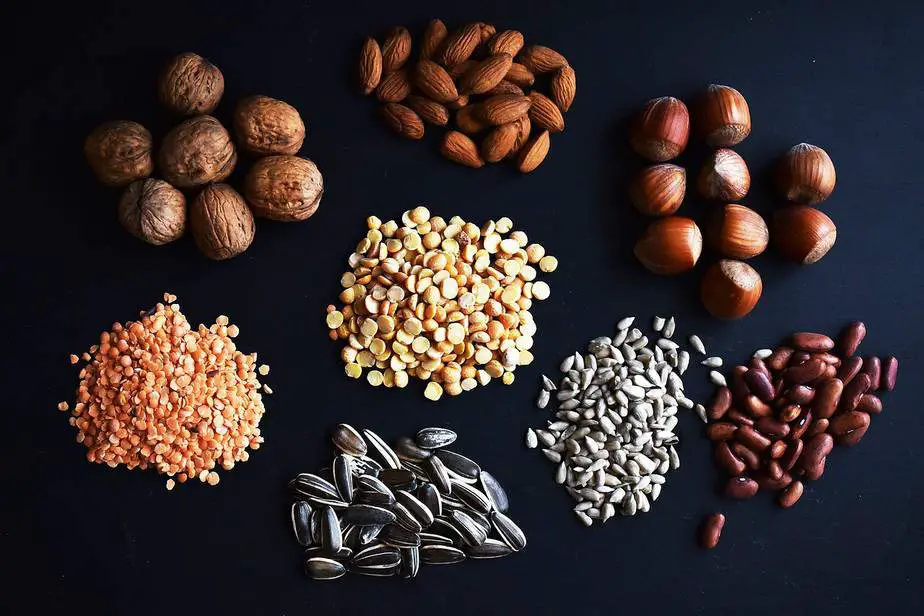
Nutrient-Rich Whole Foods-
Other nutrients are important for your overall health and for your body’s function. Vitamins and minerals are all needed in small amounts for all of your body systems to work properly. At your top health, your climbing ability will be majorly increased, and your improvement rate will be phenomenal, plus you will feel great.
Focus on whole foods, whenever possible, and stay away from overly-processed packaged foods. Some packaged foods may be appropriate, such as certain brands of crackers and energy bars, but overall you want to be eating as many whole foods as possible.
More whole foods = more nutrients. Get as many of your nutrients from food as possible, food is always better than supplements.
Focus your snacks and meals on whole foods such as fruits, vegetables, seeds, nuts, beans, rice, oats, and other whole grains, lean meats, fish, and dairy products. You will be getting a wide variety of important nutrients to feed your body to make sure all your body processes are working at top level to keep your climbing ability at the top.
Choose a balanced diet, and you’ll be getting all of the nutrients that you need.
Fluid-
Hydration is crucial, especially for athletes. Water is the best way to stay hydrated before training. Low-fat dairy or dairy alternatives, tea, coffee, and a small amount of 100% juice is appropriate as well, but you need a large amount of additional water during the day. Skip soda and sugary beverages.
While popular, you may want to skip the energy drinks, they are usually carbonated and full of sugar and too much caffeine. A sports drink may be helpful during a long training session at the gym to replenish carbohydrate stores, but energy drinks typically contain many ingredients you should avoid.
Best Foods to Eat Before Rock Climbing:
Dietitian approved Pre-Workout Snacks for Climbing. Fuel up with a balanced meal a few hours before climbing, and follow it with a snack an hour or so before you start your workout. You’ll be ready to climb at top performance.
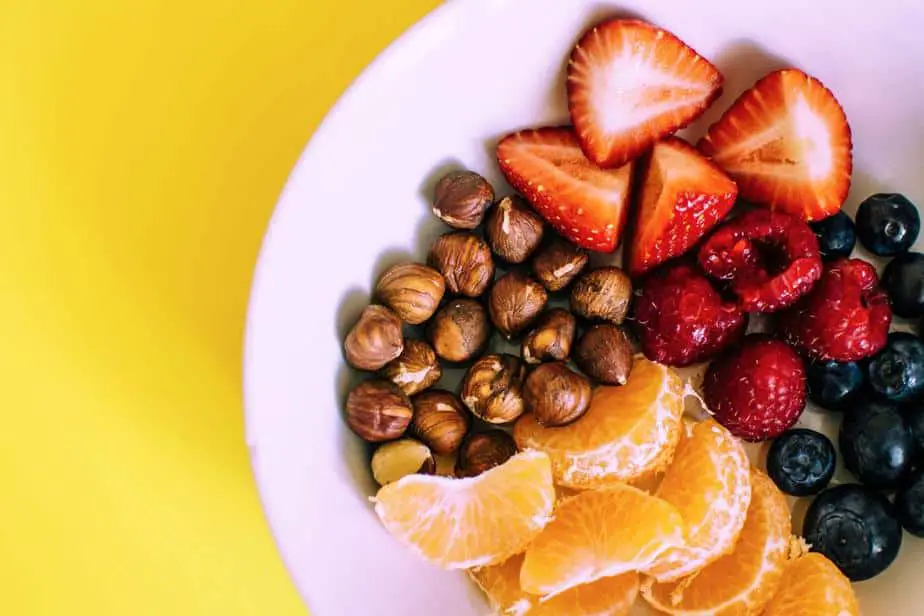
Now that you know the criteria for the best foods
before indoor rock climbing, practice creating the
perfect pre-workout snack or meal combination in those guidelines. Make sure you are combining carbohydrates and protein from nutrient-rich sources. Plus don’t forget the water! I’ve included some ideas as well.
These are around
100-300 calories each with about
15 grams of protein.
Indoor Rock Climbing Pre Workout Snack Ideas:
- Protein smoothie with Greek yogurt, chia or flax seeds, frozen fruit and vegetables, and your choice of milk. For a protein boost add oats, nut butter, or protein powder. Save half of the smoothie for post-workout.
- 1 scoop of protein powder
 in milk, water, or in a shake. Eat with a piece of fruit
in milk, water, or in a shake. Eat with a piece of fruit
- 1 LARABAR
 and 1 string cheese
and 1 string cheese
- 1/4 cup trail mix nuts and dried fruit.
- Granola bar (look for low added sugar and high protein)
- 6 whole wheat crackers and veggies with 1/4 cup hummus (note: hummus is made from beans, which may cause intestinal discomfort for some individuals during exercise)
- A slice of toast with 1 tablespoon peanut butter and banana
- String cheese and 8 whole-grain crackers
- Apple, banana, crackers, or celery with 1-2 tablespoons peanut butter
- Rice cakes with 1 tablespoon nut butter and a banana
- Oatmeal made with nut butter or protein powder
 , and fruit
, and fruit
- Bagel with 1 tablespoon peanut butter
- 1/4 cup almonds and 1 apple
- 1 cup Greek yogurt with granola and berries
- 8 oz 100% juice and a hard-boiled egg
- 1 cup low-fat cottage cheese with fruit
- PB&J sandwich
- 1.5 cups cold cereal and 1 cup milk
- 12 oz chocolate milk (but may be more beneficial for a post-workout snack)
- String cheese and an apple
- 1 cup pasta and chicken
- 1/2 cup pretzels and 1 tablespoon peanut butter
- Energy bar
- 1 cup 100% juice and 2 hard-boiled eggs
- String cheese and 4 oz applesauce
If you don’t have a lot of time before heading to the gym, you’ll probably do best with some liquid carbohydrates before climbing such as juice or a sports drink.
Foods To Avoid or Limit Before Rock Climbing:
The perfect pre-workout snack includes carbohydrates and protein and is easy on your stomach before a workout. Pre-workout snacks should be easy to digest and not cause an upset stomach.
Some foods should be limited and/or avoided before rock climbing, including:
- Added sugar – Too much sugar can give you a lot of quick energy, but you’ll feel a “crash” later on
- Too much fat – A moderate amount of fat is recommended. Fat digests slowly and too much may cause an upset stomach
- Too much fiber– Some fiber is okay and recommended. Too much fiber may cause stomach distress
- Dairy products– Some people are sensitive to dairy and should avoid it
- Overly processed foods– You won’t be getting many nutrients from packaged foods. “Junk food” leads to fatigue and spikes and drops in blood sugar
- Carbonated beverages– The air bubbles from carbonation will stay in your stomach for an unpleasant indigestion experience during climbing.
- Alcohol– Alcoholic beverages have diuretic properties and are dehydrating. Plus, exercising under the influence is a terrible idea and can lead to injury.
- Artificial sweeteners- These can affect digestion and cause an upset stomach
- Desserts– Sweets, candy, and other desserts and treats are not the type of fuel your body is looking for when you’re trying to perform at your top potential
- Spicy foods– Know your personal limit with heat. Bland, easy-to-digest foods are best before exercise so you won’t have heartburn.
- Individual tolerances– Avoid foods that cause intestinal distress based on previous experience
- Gassy foods- Beans (you may need to watch out for hummus) and cruciferous vegetables such as cauliflower, cabbage, and broccoli are some of the “gassy foods”. You don’t want to be embarrassed or feeling intestinal discomfort while you’re climbing.
When Should you Eat Before Indoor Rock Climbing?
Be sure to eat a meal about 2-4 hours before indoor rock climbing, and a snack 30 minutes to 1 hour before heading to the gym. That way you will start your session with your fuel stores full and ready.
Related Questions:
How many calories do climbers eat per day? Rock climbers require anywhere from about 2,400-4,000 calories per day, depending on factors like age, gender, size, physical activity, and training goals. Some online calculators can help you with a recommended calorie estimation.
Try this one here.  How much protein should a climber eat?
How much protein should a climber eat? Climbers should eat between 80-120 grams of protein per day based on training regimen, weight, and overall fitness and nutrition goals. See the chart above.
How many calories do you burn rock climbing? Rock climbing can be a pretty vigorous sport if you aren’t taking too many breaks. Even belaying your partner is a bit of a workout. Calorie burn depends on climber size and amount of muscle, gender, intensity of exercise, etc. Depending on these factors and how long you rest during/between routes, you could burn anywhere from
400-900 calories per hour.
See Also:
How Much Do Rock Climbers Weigh? The Best Diet for Rock Climbers – with FREE Meal Plan
Is Indoor Rock Climbing a Good Workout?
The Best Diet for Rock Climbers – with FREE Meal Plan
Is Indoor Rock Climbing a Good Workout? How Can I Make my Climbing Shoes Last Longer?
How Can I Make my Climbing Shoes Last Longer? Is Indoor Rock Climbing Dangerous?
Is Indoor Rock Climbing Dangerous?


 , Orgain
, Orgain , Swanson,
, Swanson,  Optimum Nutrition
Optimum Nutrition , Garden of Life.
, Garden of Life. Plant-based options are: PlantFusion
Plant-based options are: PlantFusion , Vega One
, Vega One , Garden of Life
, Garden of Life , Tone it Up (for women),
, Tone it Up (for women), or Now Sports Pea Protein.
or Now Sports Pea Protein. Perfect Bar
Perfect Bar , RXBAR
, RXBAR , and Clif Bar
, and Clif Bar are some of my favorite protein bars. (I also like LARABAR
are some of my favorite protein bars. (I also like LARABAR but they are lower in protein).
For more details on protein bars or energy bars, read this article from Fueling Teens
but they are lower in protein).
For more details on protein bars or energy bars, read this article from Fueling Teens .
I wrote more details about protein intake for climbers, and made a meal plan for rock climbers, in this post:
The Best Diet for Rock Climbers with FREE Meal Plan
.
I wrote more details about protein intake for climbers, and made a meal plan for rock climbers, in this post:
The Best Diet for Rock Climbers with FREE Meal Plan


 in milk, water, or in a shake. Eat with a piece of fruit
in milk, water, or in a shake. Eat with a piece of fruit and 1 string cheese
and 1 string cheese , and fruit
, and fruit How much protein should a climber eat? Climbers should eat between 80-120 grams of protein per day based on training regimen, weight, and overall fitness and nutrition goals. See the chart above.
How many calories do you burn rock climbing? Rock climbing can be a pretty vigorous sport if you aren’t taking too many breaks. Even belaying your partner is a bit of a workout. Calorie burn depends on climber size and amount of muscle, gender, intensity of exercise, etc. Depending on these factors and how long you rest during/between routes, you could burn anywhere from 400-900 calories per hour.
How much protein should a climber eat? Climbers should eat between 80-120 grams of protein per day based on training regimen, weight, and overall fitness and nutrition goals. See the chart above.
How many calories do you burn rock climbing? Rock climbing can be a pretty vigorous sport if you aren’t taking too many breaks. Even belaying your partner is a bit of a workout. Calorie burn depends on climber size and amount of muscle, gender, intensity of exercise, etc. Depending on these factors and how long you rest during/between routes, you could burn anywhere from 400-900 calories per hour.
 The Best Diet for Rock Climbers – with FREE Meal Plan
Is Indoor Rock Climbing a Good Workout?
The Best Diet for Rock Climbers – with FREE Meal Plan
Is Indoor Rock Climbing a Good Workout? How Can I Make my Climbing Shoes Last Longer?
How Can I Make my Climbing Shoes Last Longer? Is Indoor Rock Climbing Dangerous?
Is Indoor Rock Climbing Dangerous?
